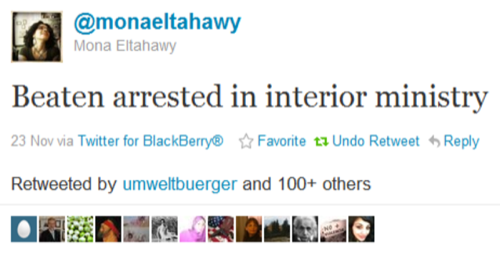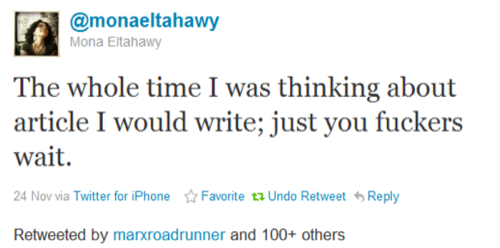Mona Eltahawy, an Egyptian-American journalist, blogger and frequent source of information for ReadWriteWeb Egypt coverage, was arrested at the Ministry of the Interior in Cairo on Wednesday. She was beaten and assaulted by police, interrogated by military intelligence and finally freed 12 hours later.

She borrowed the Blackberry of another protester arrested and detained with her to tweet, “Beaten arrested in interior ministry.”
Between the time she was arrested and the time she was released (tweeting, “I AM FREE“), the hashtag #freemona had become a worldwide trending topic, sparked, in part, by New York Times columnist Nick Kristof. In fact, it only took 20 minutes to trend.

The State Department responded on their Twitter account, saying, “Reports of @monaeltahawy and @pangeaworld detention very concerning. @USEmbassyCairo engaging authorities.”
@pangeaworld referred to Jehane Noujaim, the Egyptian-American filmmaker best known for her 2004 documentary “Control Room” about Al Jazeera. She was later let go, as was activist Maged Butter, who was released with 28 other detainees yesterday.
While in custoday, Eltahawy was beaten savagely, her arm and hand were broken and are now in casts, and she was sexually assaulted by the police, who surrounded her and groped and grabbed at her breasts and genitals. She has commented that her notoriety and American citizenship protected her against worse treatment.
One of the trends in comments on Twitter was how very badly the military had erred in arresting someone so vocal and relentless in pressing her case in the media. Well, she puts it best:

Still in military custody, between 12,000 and 13,000 citizens, the best known of whom are probably long-time Egyptian blogger and gadfly Alaa Abdel Fattah, and Maikel Nabil Sanad. Nabil was the first blogger to be arrested and sentenced in post-Mubarak Egypt, and the “indicator species” that the people and the military were not, contrary to earlier Tahrir chants, the same hand.
Maikel was sentenced to two and a half years in prison by a military tribunal. His case has inspired a great deal less outrage than others, possibly because he is both Coptic Christian, an often beset minority in the country, and has blogged positively about Israel. After an attention-raising hunger strike (he survives, barely, on milk and juices), the military transferred him to a mental hospital, where he awaits a November 27 retrail.
Psychiatric detention is one of the weapons the Egyptian authorities use, along with beatings, torture, imprisonment and sexual assault, to enforce their will.





















